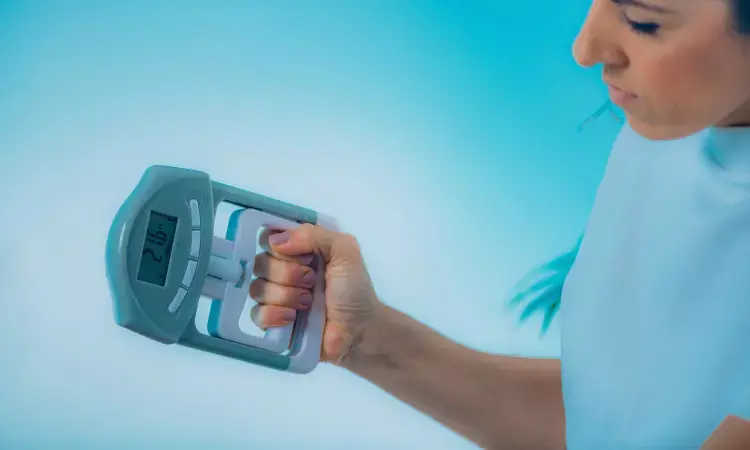- Home
- Medical news & Guidelines
- Anesthesiology
- Cardiology and CTVS
- Critical Care
- Dentistry
- Dermatology
- Diabetes and Endocrinology
- ENT
- Gastroenterology
- Medicine
- Nephrology
- Neurology
- Obstretics-Gynaecology
- Oncology
- Ophthalmology
- Orthopaedics
- Pediatrics-Neonatology
- Psychiatry
- Pulmonology
- Radiology
- Surgery
- Urology
- Laboratory Medicine
- Diet
- Nursing
- Paramedical
- Physiotherapy
- Health news
- Fact Check
- Bone Health Fact Check
- Brain Health Fact Check
- Cancer Related Fact Check
- Child Care Fact Check
- Dental and oral health fact check
- Diabetes and metabolic health fact check
- Diet and Nutrition Fact Check
- Eye and ENT Care Fact Check
- Fitness fact check
- Gut health fact check
- Heart health fact check
- Kidney health fact check
- Medical education fact check
- Men's health fact check
- Respiratory fact check
- Skin and hair care fact check
- Vaccine and Immunization fact check
- Women's health fact check
- AYUSH
- State News
- Andaman and Nicobar Islands
- Andhra Pradesh
- Arunachal Pradesh
- Assam
- Bihar
- Chandigarh
- Chattisgarh
- Dadra and Nagar Haveli
- Daman and Diu
- Delhi
- Goa
- Gujarat
- Haryana
- Himachal Pradesh
- Jammu & Kashmir
- Jharkhand
- Karnataka
- Kerala
- Ladakh
- Lakshadweep
- Madhya Pradesh
- Maharashtra
- Manipur
- Meghalaya
- Mizoram
- Nagaland
- Odisha
- Puducherry
- Punjab
- Rajasthan
- Sikkim
- Tamil Nadu
- Telangana
- Tripura
- Uttar Pradesh
- Uttrakhand
- West Bengal
- Medical Education
- Industry
Higher handgrip strength tied to lower risk of depression in older adults, study claims

Spain: According to a study published in the British Journal of Psychiatry, in older adults, "Higher the strength of handgrip, lower is the risk of depression." The study has mentioned that practitioners should consider the handgrip strength threshold to screen for the risk of depression in older adults.
Depression is one of the significant health concerns. The handgrip strength is a single marker of frailty.
Studies have solely focused on the association between handgrip strength and depression risk in single countries or general populations. There needs to be more data and knowledge in this context.
Considering this, Rubén López-Bueno and colleagues investigated this association in adults aged 50 years and older.
The study summary is as follows:
- Data was used from the SHARE.
- Using a handheld dynamometer, handgrip strength was determined.
- One hundred fifteen thousand six hundred one participants with a mean age of 64.3 years were included in the study.
- The follow-up period was 7.3 years.
- Thirty thousand two hundred eight participants constituting 26.1%, experienced depression risk.
- There was a significant association between a stronger handgrip, up to 40 kg in men (HR 1.39) and 27 kg in women (HR 1.28), and lower depression risk.
To prevent depression, being physically strong is a potential option.
The study's findings warrant programmes of strength training to reduce depression risk.
Further reading:
López-Bueno, R., Calatayud, J., Andersen, L., Casaña, J., Koyanagi, A., Del Pozo Cruz, B., & Smith, L. (2022). Dose–response association of handgrip strength and risk of depression: A longitudinal study of 115 601 older adults from 24 countries. The British Journal of Psychiatry, 1-8. doi:10.1192/bjp.2022.178
BDS, MDS in Periodontics and Implantology
Dr. Aditi Yadav is a BDS, MDS in Periodontics and Implantology. She has a clinical experience of 5 years as a laser dental surgeon. She also has a Diploma in clinical research and pharmacovigilance and is a Certified data scientist. She is currently working as a content developer in e-health services. Dr. Yadav has a keen interest in Medical Journalism and is actively involved in Medical Research writing.
Dr Kamal Kant Kohli-MBBS, DTCD- a chest specialist with more than 30 years of practice and a flair for writing clinical articles, Dr Kamal Kant Kohli joined Medical Dialogues as a Chief Editor of Medical News. Besides writing articles, as an editor, he proofreads and verifies all the medical content published on Medical Dialogues including those coming from journals, studies,medical conferences,guidelines etc. Email: drkohli@medicaldialogues.in. Contact no. 011-43720751


